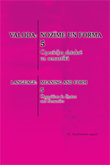Vai sintaksē pastāv bināra opozīcija obligāts/neobligāts?
Does obligatory/non-obligatory form a binary opposition in syntax?
Author(s): Ilze LokmaneSubject(s): Language and Literature Studies, Theoretical Linguistics, Syntax, Baltic Languages
Published by: Latvijas Universitātes Akadēmiskais apgāds
Keywords: sintaktiskais obligātums; semantiskā loma; komunikatīvais nolūks;
Summary/Abstract: Obligatory or compulsory components of syntactic structures have been opposed to non-obligatory ones in many syntactic theories. However, this opposition is not obvious at all, as far as many of the illustrating examples in linguistic literature are dubious. Thus the aim of the article is to find out the main factors determining obligatoriness and to decide whether obligatory components can always be distinguished from non-obligatory ones. It is concluded that obligatoriness is closely linked to the lexical meaning of the predicate, or, more precisely, some specific semantic elements in it, as well as syntactic structure of the sentence as a whole. However, the most important factor is the situation of speech and the communicative goal of the speaker who decides which participant roles should be syntactically realized in the utterance. Another conclusion is that there exists gradual transition from obligatory to non-obligatory rather than a clear-cut distinction between the two poles.
Journal: Valoda: nozīme un forma
- Issue Year: 2014
- Issue No: 5
- Page Range: 113-123
- Page Count: 11
- Language: Latvian

